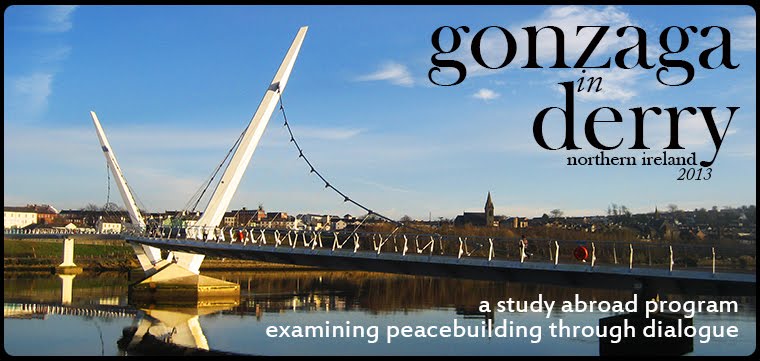In 1972, ten-year old Richard Moore, was on his
way home from Rosemont Primary School in Derry/Londonderry when he was shot in the eye with
a plastic bullet. He has been blind since that time.
In an instant Richard's world turned to darkness.
Richard’s story is about forgiveness and compassion.
“I am a victim of the troubles and there is nothing I can do about
that but I refuse to be a victim of anger and I do have control over that.”
He questions why anyone would want to be
angry and live anger.
He believes that forgiveness is a gift for
yourself: it’s not for the other person. Forgiveness doesn’t change the past,
but it can change the future. Forgiveness is not about the perpetrator; instead
it is first and foremost about your ability to let go. When you can do that
anything is possible.
Six years ago Richard met the soldier (Charles)
who shot him. He rehearsed what he would say at that meeting because he wanted Charles
to know he has no animosity towards him and that he forgives him.
Dialogue is a bridge and an opportunity to come together.
The statue 'Hands Across the Divide' in Derry/Londonderry.
The statue 'Hands Across the Divide' in Derry/Londonderry.
For Richard, forgiveness was easy, but he knows
it isn’t easy for everyone. Clearly victims never want to be victims but it
doesn’t mean they don’t have the capacity to forgive.
Richard is not saying that by forgiving others
you say that what they did was okay. Forgiveness isn’t about justice.
Richard hopes his story is an example of how
forgiveness can have an impact on the future. He explained that emotions and
feelings are like cells within the mind and each of us holds the key.
“If my
ability to forgive is held by the soldier then he has the key. Sorry is a type of key. If I am
unwilling to forgive Charles unless he says sorry, then I have given Charles
the key. In my mind, I shouldn’t give Charles the key.”
According to Richard, the peace process isn’t only
about what’s happening in Northern Ireland – it’s also about what’s happening internally. He believes we can implement
structures of the peace process such as government policies, environmental
conditions, dialogue, but those structures mean nothing if you’re not at peace
with yourself.
It’s simple. The bottom line is there’s never
going to be peace where there is conflict. People need to talk. People need to
listen. People need to share. And in the end it’s okay to agree to disagree.
It’s
a personal journey and dialogue is the key. Richard wanted
to tell his story about forgiveness and compassion to show that forgiveness is
possible. He will continue to share his story. In 2009 he wrote Can I Give Him My Eyes?

I only learned of his friendship with the Dalai Lama when I read the back cover of his book. In conversation with other members of the community I heard many stories about Richard's special relationship with the Dalai Lama. The stories were clear evidence of Richard's humanity and further proof that he is a living example of truth, forgiveness and compassion.
In 1996 Richard Moore founded the charity Children in Crossfire because he wanted to give something back.
Documentary on Children in Crossfire.
The office of Children in Crossfire at 2 St. Joseph's Avenue Derry/Londonderry













Richard is truly an inspiration! Thank you Shelley for creating and sharing such a wonderful article. My hope after reading this, is that we will be open to carry Richard's capacity to forgive within each one of us! I know I will.
ReplyDelete